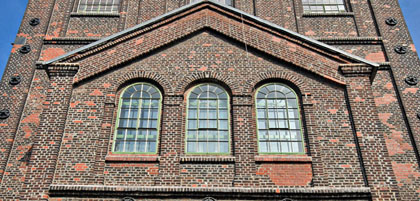Composition of the M.A.-Programs

The Master's program in History is a research-oriented course of study which aims to enable graduates to carry out scientific work and to use it for professional and social purposes. On the basis of these advanced analytical and methodological skills, which are oriented towards current research, independent scientific work is also possible in previously untapped research fields. The knowledge and skills of scientific research, preparation and presentation and the acquisition of further skills, which are deepened in the Master's phase, open up a wide range of possible professions for the graduates. The interdisciplinary and internationally oriented differentiation in the Master's programme in History as well as the possibility of acquiring in-depth knowledge for a special field of study meet the high requirements of subject-related professions or further education institutions (e.g. museums, archives, memorials). In addition, historians with the above-mentioned competences are employed in science as well as in the media (print, television, radio, online) or public relations. After successful completion of the Master's programme in History, a further academic qualification in the field of history can also be obtained through a PhD-program or in research projects at the RUB and other universities.
The 2-Fach program
In the 2-Fach model of the Master's phase, a total of 4 modules must be studied and two different study foci must be set: Focus A and B. In Focus A an oral final examination (30 minutes) must be taken. The subject area for the Master thesis must also be chosen from this specialisation. In Focus B the exam-relevant module X must be successfully completed. At the beginning of the study of the two specialisation areas, modules IX and X are completed. In both of these, in addition to overview knowledge, the focus is on independent research and the reception of research results as well as active participation in the processing of research problems. Subsequently, the sequence of the modules can be arranged individually. In the modules XI and XII the selected main topics are further developed in terms of content and methodology.
Examination Office
The 1-Fach program
In the 1-Fach model of the Master's phase, a total of 5 modules must be studied and three different study foci must be set. The selected specialisations must be added in the supplementary area by content or methodological aspects from fields of study of related subject fields. In the supplementary area, modules of at least 27 credit points must be studied. One of these modules is relevant for the examination. The final oral examination (30 minutes) must be taken in the main subject A. The subject area for the Master's thesis must also be chosen from this focus. Module X, which is relevant for the examination, must be successfully completed in Focus B. At the end of the Master level a final exam must be written. At the beginning of the Master's phase, the study programme begins with modules IX, X and XIV. In addition to overview knowledge, these modules focus on independent research and the reception of research results as well as active participation in the processing of research problems. Subsequently, the sequence of the modules can be arranged individually. In the modules XI and XIII, the selected focal points are further developed in terms of content and methodology.
Since the winter semester 2018/19, it has been possible to study the 1-subject Master's programme with the focus on „Osteuropastudien mit Praxisbezug“ (Eastern European Studies with Practical Relevance). This focus offers an additional option and qualification possibility. A one-semester practical module is offered as part of the specialisation.
Eastern European Studies with Practical Relevance curriculum
The Master of Education
The Master's degree in history as a teaching subject is combined with a corresponding study of another teaching subject for grammar schools and comprehensive schools as well as with the educational science course which is compulsory for all students. The two subjects and the Educational Science program each account for about one third of the study- and examination time. One of the prerequisites for enrolment in the Master's program is the Latinum. This must be proven at the latest when registering for the first module final examination. Knowledge of a total of three foreign languages is required for the Master's program. Two of the three foreign languages (English and one other foreign language) had to be proven already in the Bachelor's programme. The Master's level is designed for a total of 4 semesters. At the end, the Master's thesis is written in one of the two teaching subjects or in educational science. The master's thesis in history can be written in one of the two main subjects or in the field of didactics.
Master of Education program
The Public History Master
Within the last two decades, public debate and a growing interest in history by a broader public can be observed. This results in a growing demand in society for historical advice as well as a multiplying of research and professional fields for the discipline of history. These are the challenges which the Master's program in Public History wants to meet.
Public History study program
International and interdisciplinary Master programs
The Department of History is involved in several international and interdisciplinary Master's programs: In addition to the Bochum-Tours program, these are: Medieval and Renaissance Studies (MARS); Master's Program European Culture and Economy (ECUE); Gender Studies; Eastern European Studies with Practical Relevance; History, Philosophy and Culture of Science (HPS+). The Institute of History is also involved in the European Master in Women's and Gender History (Matilda). All these courses can be reached via the menu on the left.


